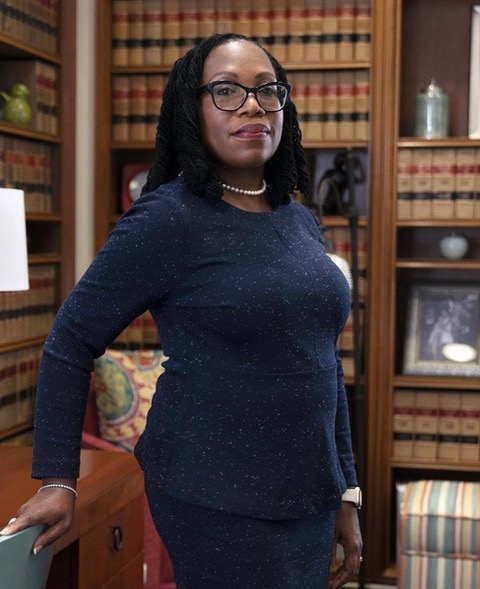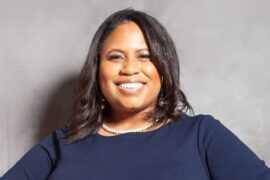April 8, 2022, was a historic day. It was the day that the Senate of the United States confirmed Judge Ketanji Brown Jackson to the Supreme Court. She is the first African American woman to serve the position. She was educated at Harvard University and went to public schools also. Her parents, Johnny and Ellery, are educators. She is married to Dr. Patrick Johnson, and they have two daughters, Talia and Leila.
The remarks made by President Joseph Biden during this appointment were significant as he brought perspective. Her comments capture a historical position, a personal one, and a future one.
I am sharing with you from the White House excerpts from the President and Justice Jackson on this beautiful historic day. She made America proud, but your heart swells if you are a Black woman. If you are a young woman beginning your career or a teen, another door opened for a new generation with opportunity and possibility. And still, we rise. So I thought it essential to capture the moment.
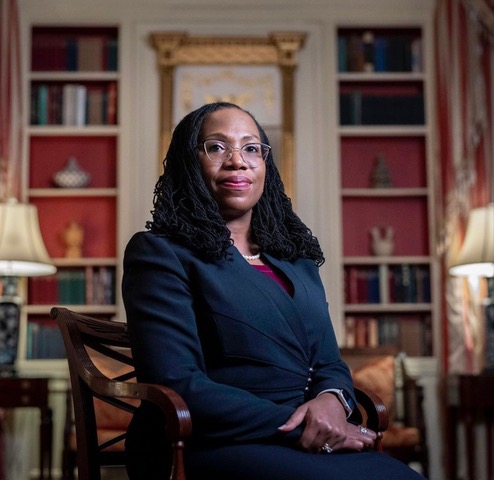
Today is a good day, a day that history will remember. And in the years to come, they’re going to be proud of what we did, and which (inaudible) — Dick Durbin did as the committee chairman. (Applause.) I’m serious, Dick. I’m deadly earnest when I say that.
To turn to our children and grandchildren and say, “I was there.” “I was there.” That — this is one of those moments, in my view.
Today, my fellow Americans, I’m honored to officially introduce to you the next Associate Justice of the Supreme Court of the United States, Ketanji Brown Jackson. (Applause.)
After more than 20 hours of questioning at her hearing and nearly 100 meetings — she made herself available to every single senator who wanted to speak to her and spoke for more than just a few minutes, answering their questions in private as well as before the committee — we all saw the kind of justice she’ll be: Fair and impartial. Thoughtful. Careful. Precise. Precise. Brilliant. A brilliant legal mind with deep knowledge of the law. And a judicial temperament — which was equally important, in my view — that’s calm and in command. And a humility that allows so many Americans to see themselves in Ketanji Brown Jackson.
That brings a rare combination of expertise and qualifications to the Court. A federal judge who has served on the second most powerful Court in America behind the Supreme Court. A former federal public defender with the — (applause) — with the ability to explain complicated issues in the law in ways everybody — all people — can understand—a new perspective.
When I committed to nominating a Black woman to the Supreme Court, I could see this day. I literally could see this day because I thought about it for a long, long time. As Jill and Naomi would tell you, I wasn’t going to run again. But when I decided to run, this was one of the first decisions I made. I could see it. I could see it as a day of hope, a day of promise, a day of progress, a day when, once again, the moral arc of the universe, as Barack used to quote all the time, bends just a little more toward justice.
I knew it wouldn’t be easy, but I knew the person I nominated would be put through a painful and difficult confirmation process. But I have to tell you, what Judge Jackson was put through was well beyond that. There was verbal abuse. The anger. The constant interruptions. The most vile, baseless assertions and accusations.
In the face of it all, Judge Jackson showed the incredible character and integrity she possesses. (Applause.) Poise. Poise and composure. Patience and restraint. And, yes, perseverance and even joy. (Applause.) Even joy.
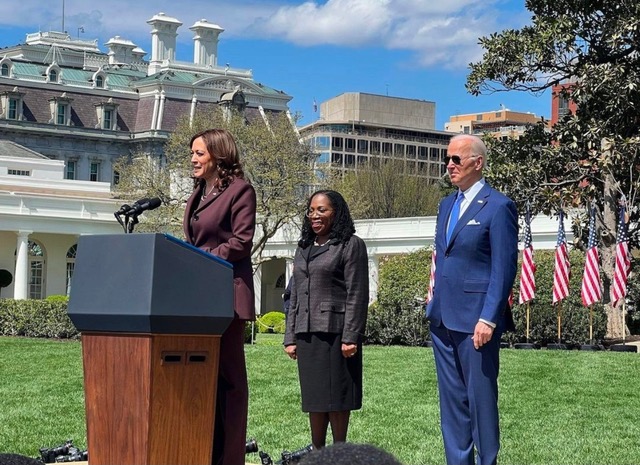
Look, it’s a powerful thing when people can see themselves in others. Think about that. What’s the most powerful thing — I’ll bet every one of you can go back and think of a time in your life when there was a teacher, a family member, a neighbor — somebody — somebody who made you believe that you could be whatever you wanted to be. It’s a powerful, powerful, powerful notion.
And that’s one of the reasons I believed so strongly that we needed a Court that looks like America. Not just the Supreme Court. (Applause)
That’s why I’m proud to say, with the great help of Dick Durbin, I’ve nominated more Black women judges to the federal appellate courts than all previous presidents combined. (Applause.) Combined.
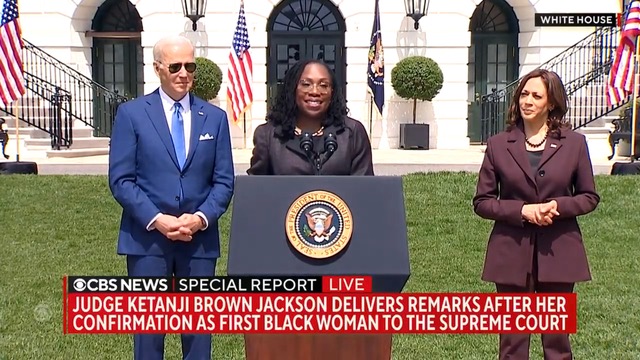
Justice Brown began her speech by thanking her family, her mentors, her friends, and members of the White House. This is an excerpt of her remarks.
“It has taken 232 years and 115 prior appointments for a Black woman to be selected to serve on the Supreme Court of the United States. (Applause.)
But we’ve made it. (Applause.) We’ve made it, all of us. All of us.
And — and our children are telling me that they see now, more than ever, that, here in America, anything is possible. (Applause.)
They also tell me that I’m a role model, which I take both as an opportunity and as a huge responsibility. I am feeling up to the task, primarily because I know that I am not alone. I am standing on the shoulders of my own role models, generations of Americans who never had anything close to this kind of opportunity but who got up every day and went to work believing in the promise of America, showing others through their determination and, yes, their perseverance that good — good things can be done in this great country — from my grandparents on both sides who had only a grade-school education but instilled in my parents the importance of learning, to my parents who went to racially segregated schools growing up and were the first in their families to have the chance to go to college.
I am also ever buoyed by the leadership of generations past who helped to light the way: Dr. Martin Luther King Jr., Justice Thurgood Marshall, and my personal heroine, Judge Constance Baker Motley. (Applause.)
They, and so many others, did the heavy lifting that made this day possible. And for all of the talk of this historic nomination and now confirmation, I think of them as the true pathbreakers. I am just the very lucky first inheritor of the dream of liberty and justice for all. (Applause.)
To be sure, I have worked hard to get to this point in my career, and I have now achieved something far beyond anything my grandparents could’ve possibly ever imagined. But no one does this on their own. The path was cleared for me so that I might rise to this occasion.
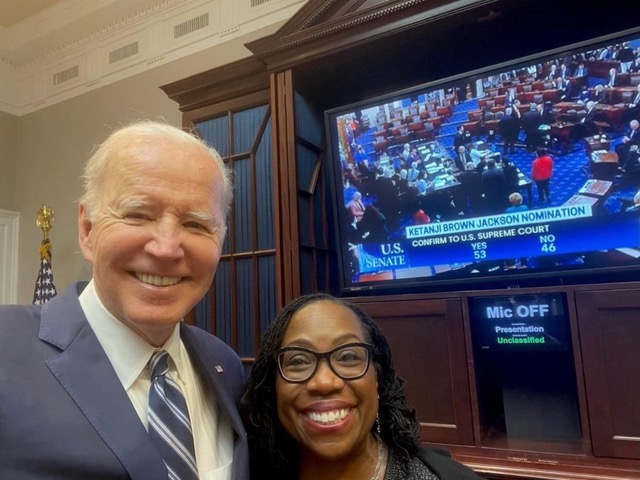
And in the poetic words of Dr. Maya Angelou, I do so now while “bringing the gifts…my ancestors gave.” (Applause.) “I am the dream and the hope of the slave.” (Applause.)
So as I take on this new role, I strongly believe that this is a moment in which all Americans can take great pride.
We have come a long way toward perfecting our union.
In my family, it took just one generation to go from Segregation to the Supreme Court of the United States. (Applause.)
And it is an honor — the honor of a lifetime — for me to have this chance to join the Court, to promote the rule of law at the highest level, and to do my part to carry our shared project of democracy and equal justice under law forward, into the future.
Thank you, again, Mr. President and members of the Senate for this incredible honor. (Applause.) “


